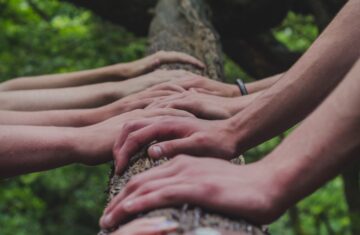Reaching out for help when we feel our most vulnerable is one of the hardest things we may ever need to do. This search may be for our own personal struggles or to find help for someone we love.
When you need help, where do you look to find it? What do you typically do?
Search Google?
Search YouTube?
Many of us do start by turning to Google or YouTube as this is convenient, accessible and anonymous. Maybe this is you right now, alone and vulnerable and searching for help. I can see the attraction of online psychology quizzes that will perhaps help us to find a diagnosis or label that fits for us or our loved one. There can be a comfort for some in the knowledge that their symptoms ‘fit’ with a known ‘disorder’. Having found a fitting label or relatable topic, our next step may be to search for relevant articles.
- How to live with a narcissistic mother?
- How to live with PTSD?
- How to live with someone who is depressed?
- How to deal with a bully?
- How to save my marriage?
- How to improve my self-worth?
- How to parent my teenager?
- How to cope with my dysfunctional parents?
We read the articles and books and we watch the YouTube videos and we listen to the podcasts and we sign up to a free online personal development course and watch and read some more. All of this can be done in the safety and comfort of our own home and we hope that we will learn some information that will somehow transform our lives.
I am not here to knock any of those resources and of course there will no doubt be some interesting information and ideas to be learnt. However, the effect of what we read or watch may have minimal impact. There are differing statistics regarding this; however, all research agrees that we retain little of what we read or hear compared to what we retain if we actually experience something.
I sometimes illustrate this with reading a book all about coral reefs or watching a documentary all about coral reefs. I wonder how much we would absorb and I certainly wonder how much we would remember in a week or two. Compare that with a holiday in which you actually visit coral reefs. It would take planning and sacrifice, you might need to travel by means of transport that you don’t like. You might have a fear of flying or a fear of water. You might not be a strong swimmer. You challenge yourself to move way out of your comfort zone, you put on the necessary swim gear, you gently move into the water and at some point, you take a deep dive and snorkel in and around the reefs and fish. Wow! What a treasure trove of learning and experience. How long would your memories of the whole experience be with you? Years? Decades? Probably your entire lifetime.
The idea of finding our ‘label’ and finding an article that will solve our challenges is seductive. It would be wonderful if our struggles could be solved this way. However, despite the almost 6 billion pages on the internet related to mental health, mental health concerns are endemic. Clearly, learning information is not enough to make the difference that is needed in our lives. Why not? Because sitting alone reading material or watching videos is ultimately still alone. In this isolated context, we are still only in our mind, in our thoughts. We need more. We need the experience of the deep dive.
One powerful way to take the learning and make it experiential, is to learn and share in a safe group of like-minded individuals. If that sounds terrifying to you right now, please be curious about that feeling. Why is it terrifying? Because you know that it would be so much more challenging and real. You know that you would be stretched outside of your comfort zone. And isn’t that in itself so interesting – you are experiencing something already!
One powerful way to take the learning and make it experiential is to learn and share in a safe group of like-minded individuals. If that sounds terrifying to you right now, please be curious about that feeling. Why is it terrifying?
One of my favourite expressions is that ‘all growth takes place outside of the comfort zone’. Terrifying as a group experience may sound, in a safe and nurturing group experience something magical happens. Our learning becomes experiential, alive and dynamic. This kind of learning has a durability because it is a whole-body experience. Rather than theoretically learning about something, we get to experience something. It’s the difference between reading a book about how to swim versus actually getting in the water with lots of safety gear and an experienced coach. The learning is real and embodied.
Some beautiful aspects of group work are listed below. These experiences are all possible when a group has been carefully formed, safely held and well-facilitated. As you read this list, I hope you can begin to imagine how group work might support you.
Aspects of group work
Some beautiful aspects of group work are listed below. These experiences are all possible when a group has been carefully formed, safely held and well-facilitated. As you read this list, I hope you can begin to imagine how group work might support you.
- Realising that others have similar fears, struggles, worries and feelings and that we are therefore not crazy, weird or worthless. We are human, experiencing the richness of the human condition.
- Learning from others, not only about their struggles, but witnessing how they think and feel and manage their situation with real-life examples.
- Feeling deep and meaningful connections with others in the group. Discussing topics that are not superficial and being honest with each other develops a connectedness that may be rare in our life. A sense of belonging begins to grow.
- Gradually feeling safe enough to be more and more real. Tentatively sharing the pieces that may feel embarrassing or even shameful and then realising that no-one has run away. Beginning to experience the unconditional acceptance of the group.
These are just some of the fabulous advantages of an experiential personal development group. Nothing is pre-recorded. Nothing is experienced alone. There is dialogue and interchange. It is inspiring and engaging throughout.
Please glance at the following examples and imagine the powerful value of being in a group in the light of the beautiful aspects above.
Social anxiety: If we are struggling (as so many are) with social anxiety, we have an opportunity to explore actually being with our anxiety in a real, yet safe environment. We find ourselves moving through our social anxiety.
Assertiveness: Rather than theoretically learning about assertiveness, in a group we have opportunities to formulate and express our thoughts out loud and can feel what it is like to hear our own voice expressing sometimes difficult things to others. We realise that we are asserting ourselves.
Loneliness: If we are feeling isolated, lonely and disconnected from others, rather than read about how to build connections, we can actually feel our connectedness to the group. We are no longer alone.
Communication: If we struggle to communicate effectively with others we have an opportunity to practice our skills with a variety of personalities and also to discover more about how we are perceived and understood by others. We find ourselves communicating effectively.
Validation: If we are seeking some external validation and acceptance and are not receiving this from our parents, families or workmates, we begin to feel the nourishment of validation within the group. We experience it – we feel it.
Boundaries: If we want to develop and hold firm boundaries in our life, but don’t know how to start, we can practice building boundaries in the group and we can feel the beauty of it. It doesn’t have to feel like a battle but a peaceful point of contact.
These are just a sample of ideas but I hope they illustrate the point. Group work is transformational! I have been facilitating personal development groups for fourteen years and am constantly impressed by the level of learning and growth that happens in group work. I love to see participants support each other and often forming friendships that extend beyond the duration of the group. If you are looking for real growth, I invite you to get in touch and chat about how a group could benefit you.
FAQ: How can I be sure that the group will be a safe place?
I meet with all interested people beforehand for a brief one-to-one conversation to check their readiness for this kind of work and to ensure that participants are able to support others without judgment.
On the first session with all groups, we spend time discussing and formulating a group contract which includes confidentiality, respect and other elements. This creates firm boundaries to protect the safe space.




